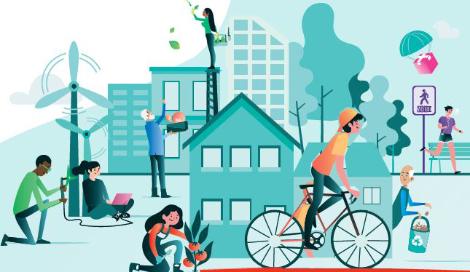Tomorrow my territory 18 Buying sustainable
Responsible purchasing
November 2019
Agence pour l’Environnement et la Maîtrise de l’Energie (ADEME)
The 20 factsheets in the collection « demain MON TERRITOIRE » have been designed to give candidates and elected officials practical keys to take action, to open up the field of possibilities based on the experiences of other elected officials, from small towns to conurbations, large urban areas or sparsely populated areas. In the four corners of France, both in metropolitan France and in the French Overseas Territories, many of them are taking action, together with the players in their territories, to prepare for the future by taking action to mitigate climate change and adapt to its effects. With its knowledge and presence throughout the country, ADEME supports them with its tools, activities and financial aid.

Why develop a sustainable purchasing policy?
From the purchase of household products to investments in equipment, from office equipment to canteen supplies, public procurement is a powerful lever for action to develop the offer towards products that are more respectful of the environment and people. At the regional level, it is also the way to concretely implement its environmental and social policies and to show the coherence of the community between its ambitions and its actions. Finally, it is a way of rethinking its needs, its purchasing practices and its use of products, goods or services… which may prove, over time, to be both more ecological and more economical! Not to mention the impact on the quality of life and the health of the inhabitants (a less polluting fleet of vehicles, less harmful cleaning products, school food that respects health and the environment…) and the possibility of participating in local economic development (inclusion of people far from work in the purchase of services, use of SMEs…). As an interface between the community and the economic fabric of the territory, public procurement can also be a powerful lever for environmental issues: waste and circular economy, fight against climate change…
How do you do it?
-
We ask about its needs, we question the existence of more sustainable solutions and we revisit its purchasing and usage practices.
-
We take advantage of all the opportunities offered by the public procurement code to take sustainable development into account (definition of needs, drafting of specifications, selection criteria, etc.).
-
We are doing away with the disposable, relying on renewable resources and promoting recycling.
-
It is revisiting its fleet of vehicles and questioning the needs related to certain types of travel, for example by substituting electric bicycles for certain vehicles.
-
We choose the equipment that consumes the least energy and is the most economical to use (electricity, water, fuel, etc.).
-
Its requirements are based on recognised labels (e.g. the European Ecolabel for non-food and AB certification for food).
-
Environmental and social provisions are integrated into its purchases of products but also services (catering, cleaning of premises, maintenance of parks, etc.), not forgetting building and public works (waste management, recycling, bio-sourced materials, etc.).
-
It takes into account the cost over the entire life cycle (purchase, use, repair, water or energy consumption, end-of-life treatment).
-
We are working on the practices of use: systematization of double-sided printing, turning off the lights, sorting of waste, including bio-waste…
-
The exemplary approach of its agents and the territory is valued by the inhabitants.
Sources
To go further
The labels
For non-food products, the European eco-label is the reference. For food products, 4 official environmental labels indicate products from organic farming (French and European AB), those from high environmental value farming (HVE) and those from sustainable fishing.